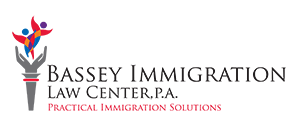What Disqualifies You from VAWA?
The Violence Against Women Act (VAWA) self-petition allows survivors of domestic violence to apply for a green card independently. However, strict criteria must be met. Common disqualifications include lack of a qualifying relationship, insufficient evidence of abuse, criminal history, immigration fraud, failure to meet residency or moral character requirements, and missed deadlines. While certain waivers may be available in specific cases, eligibility is highly fact-specific. If someone is unsure about their qualification for VAWA, they should consult with a qualified immigration attorney.
To minimize the risk of losing VAWA benefits, consult an immigration appeals attorney from the Bassey Immigration Law Center in Tampa. We have represented foreign nationals in many VAWA cases. We leverage our resources and extensive experience to keep your petition on the most favorable track for approval.
What Are the Qualifications for a VAWA-Based Immigration Petition?
To qualify for a VAWA-based immigration petition, the applicant must be a spouse, child, or parent of a U.S. citizen or lawful permanent resident (LPR) who has subjected them to battery or extreme cruelty. The petitioner must have resided with the abuser at some point, demonstrate good moral character, and provide credible evidence of the abuse through police reports, medical records, affidavits, or other supporting documents.
Spouses must prove a valid marriage and that the relationship was entered into in good faith, not solely for immigration benefits. Children must be under 21 at the time of filing (with some exceptions up to age 25), and parents must prove that their U.S. citizen child (age 21 or older) was abusive.
If the petitioner meets these qualifications, they may apply for lawful status without the abuser’s knowledge or involvement.
What Are Some Common Reasons for VAWA Disqualifications?
Many common reasons for VAWA disqualifications involve administrative matters, such as submitting incorrect forms or missing important deadlines. Other disqualifications include the following:
Lack of Qualifying Relationship
- The applicant must have been abused by a U.S. citizen or lawful permanent resident (LPR) spouse, parent, or adult child.
- If the marriage was not legally valid, or the applicant is unable to prove the relationship, the petition may be denied.
- If the marriage ended more than two years before filing (unless related to abuse), this could disqualify the applicant.
Insufficient Evidence of Abuse
- VAWA requires credible evidence of physical abuse or extreme cruelty.
- Lack of police reports, medical records, affidavits, or other proof may lead to denial.
- Psychological abuse alone can qualify, but it must be well-documented.
Criminal Record or Security Concerns
- If the applicant has a serious criminal history (e.g., aggravated felonies, drug trafficking, violent crimes), they may be ineligible.
- Crimes related to moral turpitude could affect eligibility unless waivers apply.
Immigration Violations
- Previous fraudulent immigration applications (e.g., fake marriages) can lead to ineligibility.
- Having a prior deportation order or being subject to a removal proceeding may complicate the process.
Failure to Show Good Moral Character
- Applicants must prove good moral character for at least three years before filing.
- Criminal convictions, habitual drug use, lying to immigration officials, or committing fraud may impact this requirement.
Failure to Prove Residency with the Abuser
- The applicant must have lived with the abuser at some point.
- Lack of proof (such as leases, bills, or affidavits) can be a reason for denial.
If you are eligible to take advantage of this benefit, your best strategy is to get help from a knowledgeable immigration lawyer. They can help you complete and file your petition properly and pursue it with you throughout the petition review process.
Contact the Immigration Appeals Attorneys at the Bassey Immigration Law Center
For more than 20 years, our immigration appeals lawyers at the Bassey Immigration Law Center have helped foreign nationals throughout the United States navigate the complex VAWA petition process. You can save valuable time and financial resources and eliminate the possibilities or errors when you hire our firm to represent you in your immigration petition.
Please call our offices anytime for answers to your questions about VAWA petitions or assistance with any other aspects of your immigration case.
About Bassey Immigration Law Center, P.A.
Bassey Immigration Law Center, P.A., led by attorney Aniefiok Bassey, provides comprehensive immigration services to individuals, families, and businesses in Florida and beyond. With over 20 years of experience, the firm assists clients with a wide range of immigration matters, from family reunification and green cards to business visas and deportation defense. The diverse, multilingual team is dedicated to supporting clients through the complex immigration process, with a special focus on citizenship, asylum, and LGBTQ+ immigration needs. They offer affordable initial consultations and are committed to delivering personalized, strategic guidance for achieving clients’ immigration goals.



